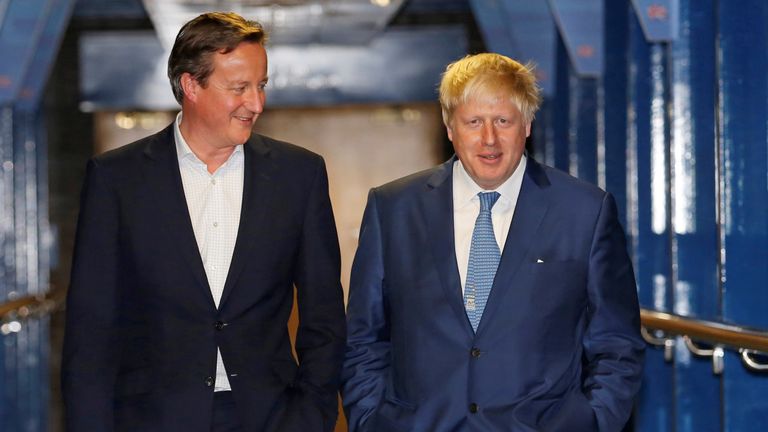COVID-19: David Cameron admits mistake in government planning for future pandemics
David Cameron has admitted his government made a mistake in planning for future pandemics during his time in office.
The former prime minister, who was in Number 10 from 2010 to 2016, told a committee hearing that the 2013 Ebola outbreak in west Africa had focused minds on the threat posed by pandemics.
But he acknowledged: “The mistake that was made was that, in thinking about future pandemics, the focus was very much on influenza rather than on respiratory diseases.
“And I’m sure there will be a big inquiry into what we learnt and all the rest, but I think there was a pretty good flu pandemic plan, but it was a flu plan rather than a respiratory diseases plan.
“… More should have been learnt from the experience with SARS and respiratory disease in terms of our own preparedness.”
Mr Cameron was speaking to MPs and Lords on the National Security Strategy Committee.
He told them that the COVID-19 pandemic was the “greatest difficulty” faced by a government in the last 50 years, with Boris Johnson also having to contend with sorting out a Brexit trade deal with the EU.
“All the former prime ministers – we speak to each other from time to time – we’d all say we had difficult decisions to make and difficult circumstances to face but nothing like this – this has been the greatest difficulty a government has had to face for 40 or 50 years,” Mr Cameron said.
“So to be fair to the government, they have had these twin challenges to deal with.”
Mr Cameron also criticised Theresa May and Mr Johnson, his successors in Downing Street.
He said Mrs May, who succeeded him in the aftermath of the 2016 EU referendum, made a “very bad mistake” in allowing the roles of cabinet secretary and national security adviser to be merged.
“They are two jobs,” Mr Cameron said.
“For one person, even if you were a cross of Einstein, Wittgenstein and Mother Teresa, you couldn’t possibly do both jobs, and I think that temporarily weakened the National Security Council.”
He said Mr Johnson’s decision to scrap the Department for International Development (DfID) was a mistake “for all sorts of reasons” and it would be “quite a task” for the foreign secretary to keep across both the diplomatic and aid briefs.
Mr Cameron also defended his wooing of China during his time as prime minister.
“My view has always been that if you want to have a dialogue and discussion with China on human rights, then actually driving that economic partnership deepens the dialogue rather than threatens it,” he said.
He ruled out the prospect of a political comeback and said he did not miss Prime Minister’s Questions.
“I certainly don’t miss Wednesday at 12 o’clock – it is a bit different now from what I can see,” Mr Cameron said.
Source: Read Full Article




